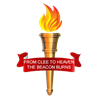OFSTED
Our school was rated 'Good' at our last inspection on October 4th and 5th 2023. For our latest OFSTED report, click here LATEST OFSTED REPORT
Key information from the report can also be read below:
What is it like to attend this school?
Pupils love attending this busy, caring and welcoming school. They arrive happily and always do their best. The school strives to give pupils a range of meaningful experiences such as becoming trained anti-bullying ambassadors and visiting places of worship. This is a ‘small’ school that provides ‘big’ opportunities.
The school has high expectations for all pupils, including those who have special educational needs and/or disabilities (SEND). As a result, pupils achieve well. They become fluent, enthusiastic readers and competent mathematicians. They revel in the broad, exciting curriculum on offer and talk with confidence about their learning.
Staff have high expectations of how pupils should behave. Pupils always display positive attitudes and behaviour, and disruption in lessons is very rare. The school culture is open and inclusive. Pupils feel safe, involved and listened to. They are caring and thoughtful, always being prepared to help one another in lessons and in the playground. On the rare occasions when behaviour falls short of expectations, pupils know that adults will help put things right. They say that adults are good at ‘talking it through to help us understand how to behave’.
What does the school do well and what does it need to do better?
This school has a broad and ambitious curriculum. It is engaging and enjoyable, while providing pupils with the knowledge they need. Good use is made of the school’s local area, which provides unique curriculum experiences because of its rich history and geographical location.
There is some variation in how well subjects are implemented. In some, including geography and mathematics, the school has been successful in identifying precisely what and how pupils will learn. This includes how the learning is organised in mixed-age classes. Pupils are becoming knowledgeable and developing good skills in these subjects.
For instance, in geography, they are able to describe exactly how rivers and mountains form. In a small number of other subjects, the implementation of the curriculum is not as strong. Pupils are not remembering as much of the curriculum as they should. The school is aware of this and has put in place plans to address it.
In lessons, teachers present information clearly and ask questions skilfully to make sure pupils understand. They select resources and activities that engage pupils. Pupils enjoy their learning, and low-level disruption is rare. Staff make appropriate adaptions so that all pupils can access the curriculum. They are skilled at supporting pupils who have SEND. They work with parents and agencies to provide pupils with high-quality support which allows them to thrive.
Children get off to a flying start in the early years. There is a focus on spoken
communication from day one, and so children become confident at sharing their feelings and ideas. The school provides carefully selected resources both indoors and outside. Children are happy and becoming independent from an early age. This sets them up well as they join Year 1.
Learning to read is a priority. From Nursery, children begin to learn phonics. Daily lessons in Reception and Year 1 ensure pupils quickly gain the knowledge and skills they need to become readers. Staff quickly identify pupils who are struggling and give additional help so that they do not fall behind. Staff and parents hear pupils read very regularly, which helps them practise and improve their reading fluency. Pupils enjoy hearing the books which staff read to them and this helps them develop knowledge of literature and a love of reading. Reading does not stop in class, and pupils often choose to read at playtimes in
the ‘reading realm’ or at book club.
Pupils benefit from an extensive breadth of opportunities. There are regular trips to enhance the curriculum, including to the local church, a mosque, a synagogue and a Hindu temple. Pupils attend residential trips and take part in sporting competitions at the
local secondary school. They act as school councillors, digital leaders, eco-club members and anti-bullying ambassadors. They run clubs for other pupils such as ‘jumping jaxx' and have even run training sessions for school staff on using the computing equipment. Pupils take these roles seriously and are being well prepared to be active citizens in their next schools and in later life.
The school has been highly successful in engaging the community and working with parents and carers. This is a strength of the school. The sense of community here is celebrated and appreciated by all.
Safeguarding
The arrangements for safeguarding are effective.
What does the school need to do to improve?
◼ The school has not implemented curriculum improvements effectively in a small number of subjects. This means that pupils do not retain as much knowledge in these subjects as they could. The school should ensure the implementation of these subjects becomes as effective as those which are strengths of the school.
